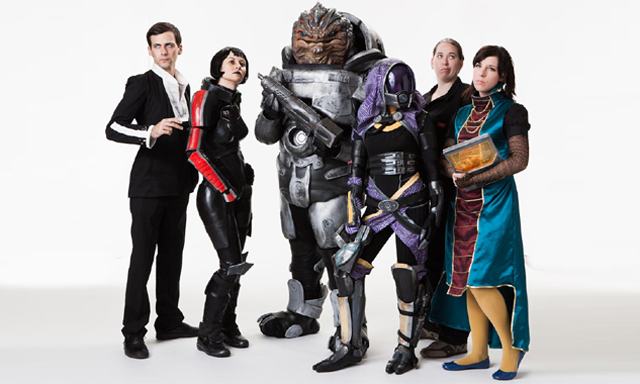 Peter Machen speaks to Morgan Spurlock, the director of Supersize Me, about Comic-Con Episode IV: A Fan’s Last Hope which premiered at this year’s Durban International Film Festival.
Peter Machen speaks to Morgan Spurlock, the director of Supersize Me, about Comic-Con Episode IV: A Fan’s Last Hope which premiered at this year’s Durban International Film Festival.
Comic-Con Episode IV: A Fan’s Last Hope is an affectionate account of the 2010 Comic-Con, a comic convention which has been taking place in San Diego annually since 1970. While Comic-Con has gradually become a major cultural event in the United States, it continues to be portrayed in the media as a giant gathering of geeks. I spoke to director Morgan Spurlock about the film, which follows various Comic Con-attendees, from dedicated fans, aspirant illustrators and costume designers to giants of the graphic novel form such as Stan Lee and Grant Morrison. By chronicling the full week of the convention, as well as the fans’ journey there, the film is as much a narrative film as it is a document of the event, making it a particularly engaging doccie.
PM: Hi Morgan. Thanks for talking to me. Firstly, I’d like to ask you why you chose not to present yourself in Comic Con as you have in your other films?
MS: You know I’m a fan. I’m a big Comic Con fan. But I thought that rather than me telling the story of Comic Con, it would make much more sense to tell the story of people who were going there with very specific purposes and who had real vested interests in what they wanted to accomplish. And I think it makes the story that much richer and more relatable.
PM: I presume that you’re a life-long comic fan. At what age did you start collecting comics?
MS: Probably when I was about eight or nine, when I started reading Spiderman. And I started getting more into comics right after that.
PM: And did anyone ever force you throw your collection away?
MS: No. But I basically got to a point – when I reached a certain age – that I got rid of a bunch of comics that were at my mom’s house. I guess it was probably around when I went to college. And I kick myself every day for doing that.
PM: Was it a very different experience making this kind of documentary, as opposed to one when you’re the talking head a lot of the time?
MS: Um, yeah. What it enabled me to do was really kind of focus and pay attention to making the film. I was able to have my mind literally focussed on the production and nothing else, without having to worry about any kind of on-camera preparation or giving any thought to having to interact or talk to people in that specific way. Which was just a great, different experience, and hopefully I’ll get to do more of that.
PM: When you made Supersize Me did it take you a while to become comfortable working with the camera?
MS: I’d been doing a lot of stuff on-camera before we made that film, so being on camera wasn’t that big a deal.
PM: And have you enjoyed the process of becoming ‘Morgan Spurlock’, this kind of left-field filmmaker and film personality?
MS: Yeah. It’s still overwhelming. I pinch myself every day. I feel incredibly lucky to get to do what I do. And I think back to when I was a kid, growing up in West Virginia, and all I ever wanted to was make movies. And now here I am, in the position of getting to do that every day. It’s a real gift, so, you know, I feel really lucky.
PM: In Comic-Con, there’s this notion of the extended childhood, the idea that we don’t have to grow up in the way that our parents’ generation had to grow up.
MS: Right.
PM: For me that’s a fantastic thing in many ways, but it’s also something that’s been heavily criticised. What are you thoughts about it?
MS: I think there are probably those who would be upset by the idea that ‘you people’ aren’t growing up. But it’s not like these people are still living in their parents’ basements. I think that’s the misnomer. That’s the vision people that have of what Comic-Con is – like ‘oh it’s just filled with all these ne’er-do-wells who live at home with their mom and dad and collect toys and play video games’. And ultimately, what’s happened, is that these are people who’ve grown up, have gotten careers, have lives, have jobs, have families, but haven’t given up childhood things.
They still love to collect toys. They still love to read comics. They still love to play video games. But they are also productive members of society. What I think the film does a great job of doing is humanising a lot of these people. Because I think what’s happened up until now, the coverage that you usually see of Comic Con is, you know, ‘Here’s a famous person to promote their new film. And look at all those weirdos in costumes’. There’s never been anything that gives you a deeper narrative into these people’s lives. And I think the film does that in a really fantastic and eloquent way.

This was an awesome doc, definitely one of my favourites from this year’s Durban International Film Festival.